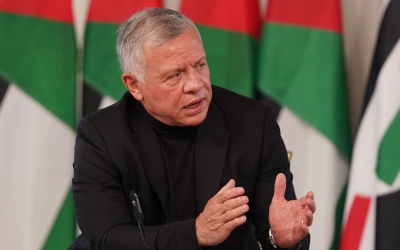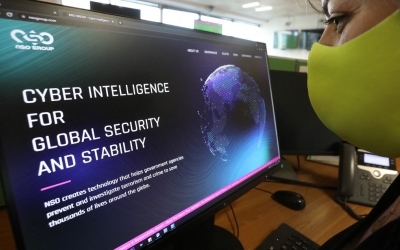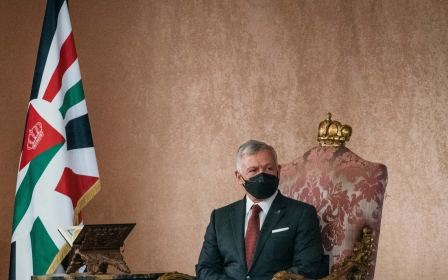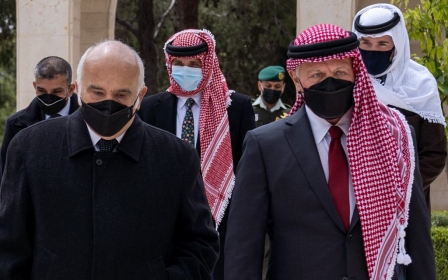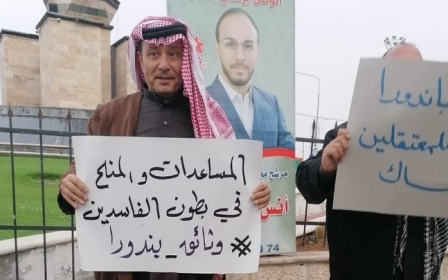Jordan: Prince Hamzah's decision to renounce title leaves public confused
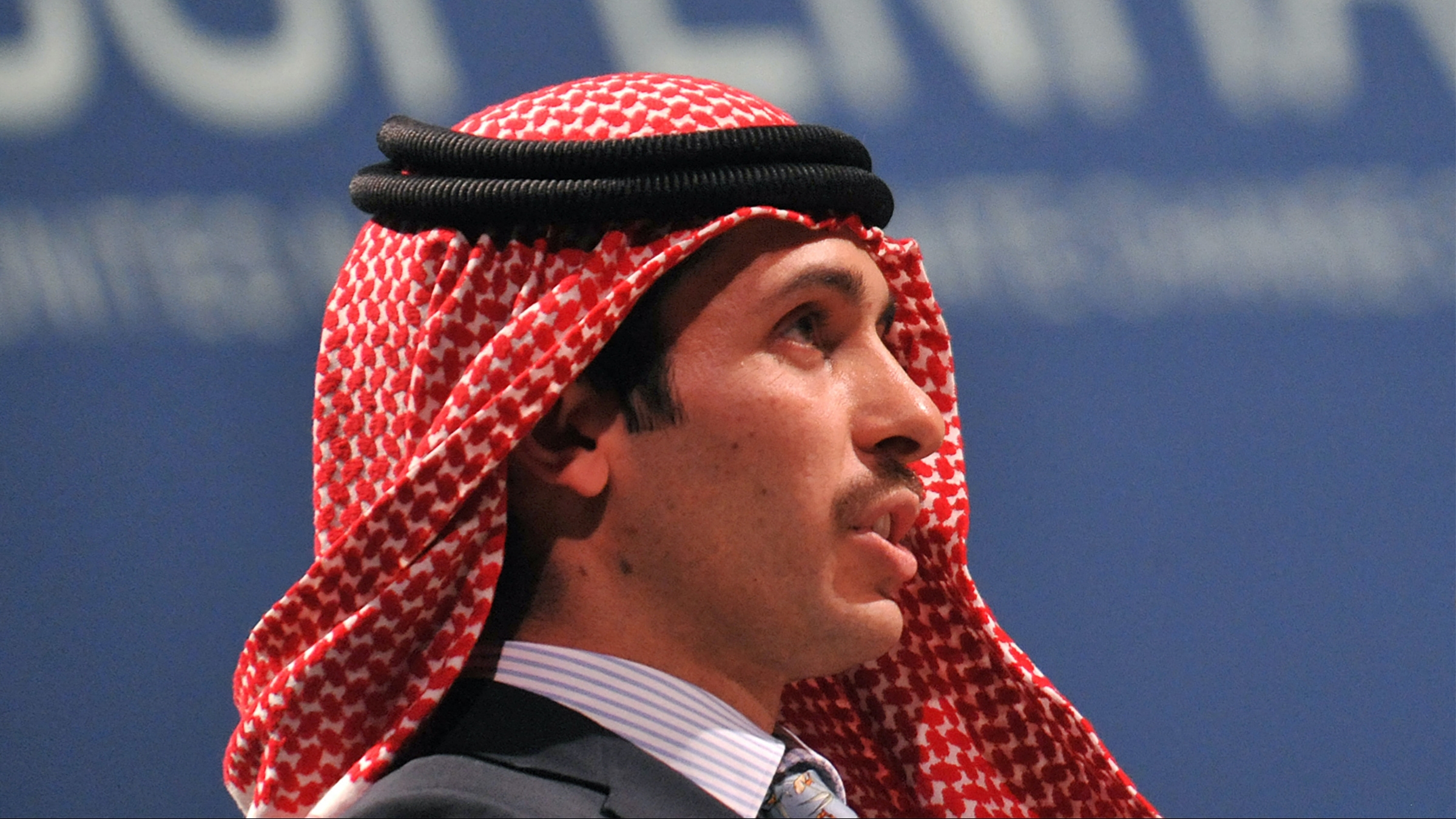
The silence of Jordan’s royal court and media surrounding the decision by former crown prince Hamzah bin Hussein to renounce his royal title has only increased the confusion felt by Jordanians at the latest development in the royal dispute.
To the dismay of Jordanians, local media has ignored the letter that Prince Hamzah, King Abdullah's half-brother, published on his Twitter account on Sunday, while the royal court has yet to release an official statement
“There is nothing official from the royal court and the letter was not published by officials and therefore we don’t even know if it is genuine, and we await to hear any official response,” a senior legal source told Middle East Eye, without giving further details.
'It is clear that the prince is having a conflict of conscience between holding the title and the way the country's institutions are being run'
- Mouin Harasis, activist
Article 37 of the Jordanian constitution clearly states that the king alone has the right to bestow and take away titles. A special royal family law, No. 24 for the year 1934, states that no member of the royal family has the right to relinquish their title without a recommendation from the royal council, which is composed of a family member chosen by the king, the prime minister, one minister chosen by the premier, the head of the judicial court, and the chief judge.
The king has the full right of accepting or rejecting the council’s recommendations.
New MEE newsletter: Jerusalem Dispatch
Sign up to get the latest insights and analysis on Israel-Palestine, alongside Turkey Unpacked and other MEE newsletters
The prince’s announcement comes almost a year after he was placed under house arrest for fomenting unrest, although the government denied he had been arrested.
Mouin Harasis, an activist affiliated with the Hirak movement of young Jordanians calling for reforms, said the Jordanian public was surprised by Prince Hamzah’s decision to relinquish his royal title.
“It is clear that the prince is having a conflict of conscience between holding the title and the way the country's institutions are being run," Harasis told MEE.
“I don’t know what the future holds, but if the prince is in the opposition trench as a Jordanian citizen, it will give the opposition a strong push forward.
"This letter has increased his popularity and given impetus to the need for a reform, the need to fight corruption and give moral support to those who reject the current political approach.”
Last April, Jordanian authorities announced that they had foiled a bid to destabilise the western-allied kingdom, marking a rare crisis in a kingdom seen as a pillar of stability in the region.
Former royal court chief Bassem Awadallah and an ex-envoy to Saudi Arabia, Sharif Hassan bin Zaid, were sentenced to 15 years in prison after they were found guilty of involvement in the alleged plot.
Prince Hamzah’s letter included renewed criticism of the way the country is being run.
"After what I have witnessed over the past years, I have come to the conclusion that my personal convictions and the values that my father instilled in me… are not in line with the approaches, trends or modern methods of our institutions," he wrote in the statement.
“As a result, and to remain faithful to God and my conscience, I do not see a way other than relinquishing the title of prince.”
Changing course
Ironically, Hamzah's decision came weeks after he sent a letter of apology to King Abudallah, in which he took “responsibility for his actions” and pledged allegiance to the constitution.
In his Sunday statement, the prince did not mention the letter, which was released by the official Jordan News Agency on 8 March. Instead, he spoke about the Jordian people and the homeland, using religious terms that Jordanians often use when they feel that they have been victims of injustice.
In an article on Al Hurra website, Jordanian writer Malek Athamneh, mainly based in Belgium, wrote that Hamzah’s move “shows confusion in his decision-making, unless he thinks that the title ties his hand politically if he’s looking to be involved in politics freely, which would be a unique precedent in the Jordanian political life.”
Former deputy prime minister Mamdouh al-Abadi told MEE that “even as the country deals with this shock”, Jordan can overcome the issue as it has done in the past with similar matters.
“This requires wisdom and experience,” he said, “In a realistic and objective observation, the change of approach that Prince Hamzah is calling for is a badly needed national requirement."
“In the past 30 years, we have gone through similar problems. We have spent decades under martial law and we overcame them by changing course to democratic rule with the 1989 elections.
“I hope we can deal with this case the way we dealt with our challenges decades ago.”
No official response
Adding to the sense of uncertainty, Queen Noor’s retweet of her son’s post led to wide-ranging reaction on social media, highlighting the absence of an official response.
Jordanian columnist Bassam Badarin read the prince's letter as another sign of the “bad handling of the sedition case by the official side,” adding that the management of the issue has been strange.
“The prince’s decision is private, and we don’t know as Jordanians whether the constitution allows a prince to relinquish his title or if the government has a position on this,” Badarin told MEE.
'Why is there no official version? why has the official media failed? Why has the Jordanian citizen been forced to listen to foreign news about Jordan?'
- Bassam Badarin, columnist
“His decision was well covered by international media because of its importance, but the local media ignored it which represents another failure. This leads us to think of what the prince had asked all Jordanians to think about, which is…to ask why this problem has lasted so long.
“Why is there no official version? Why has the official media failed? Why has the Jordanian citizen been forced to listen to foreign news about Jordan?”
Badarin believes that Prince Hamazah’s apology to the king was meant to comfort the public and lessen the shock. However, his latest move “has in principle negated the letter of apology and reinstated the controversy anew.
“The new letter sounds like the prince is trying to be a populist at a time when the official levers of government are weak.”
The hashtag Prince Hamzah has trended on Twitter since the prince stepped down, with some Jordanians divided over his decision.
“Loyalty to the homeland means not using the title to create sedition but to protect the throne from any interference and to respect the army and to address the leaders with respect. Loyalty according to Arab familial tradition is the respect of the elder brother and not using outside powers against him, no matter the differences,” one user tweeted.
Meanwhile, Mohammed Ghaleb, a journalist, wrote on Facebook that it is clear that the prince is determinedly maintaining his past positions.
“His mentioning of the oath he made to King Hussein gives the impression that there was no letter of apology, just as we had expected.”
Middle East Eye delivers independent and unrivalled coverage and analysis of the Middle East, North Africa and beyond. To learn more about republishing this content and the associated fees, please fill out this form. More about MEE can be found here.


